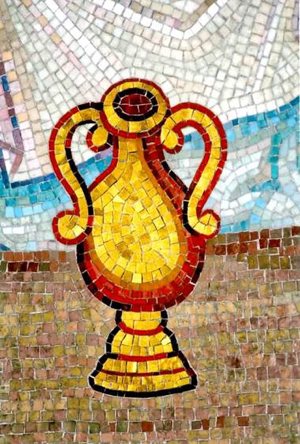“Give us some of your oil,” the foolish virgins without enough oil demanded, and the wise virgins with an ample supply of oil brusquely popped back, “No. Go get your own” (see Mt 25:8,9). The reply of those with an adequate supply of oil seems abrupt and terse, callous and insensitive. One of the marks of a true disciple is generosity (Gal 5:22), yet those with full flasks of oil refused to share. Disciples love their neighbors (Mt 22:39), yet those with sufficient oil for the night did nothing to help those in need. Those with oil appear to be cold, heartless, and devoid of love. Unexpectedly, as flawed and sinful as the virgins with full flasks of oil may appear, Jesus called them wise and admitted them into the wedding banquet. How could their refusal to share possibly be acceptable to God? How could their disregard of a needy neighbor be rewarded with a place at the heavenly banquet?
The answer is the symbolism of the oil. The arrival of the bridegroom at an unknown hour in the middle of the night represents the arrival of Jesus at the unknown hour when a person dies and must appear before the Son of Man to make an accounting of his or her life. The five wise virgins passed through the door into the wedding banquet. The question is whether the person who has died will pass through the Gates of Heaven into the Father’s House and take their place at the eternal banquet. The amount of oil in the flask will be the deciding factor.
This is a flask or oil jar. It is part of a larger mosaic in the Church of the Holy Sepulchre, Jerusalem, Israel.
The oil in the flask represents the accumulation of all the good done over the course of a person’s lifetime. A droplet is added to the flask with every prayer, good work, act of kindness, gift given, service provided, work of mercy performed (see Mt 25:35-36), and sin avoided. Oil also accumulates when a person has a faith-filled loving relationship with God, exhibits character and integrity, and is truthful and honest.
The foolish virgins were under the false impression that they could use someone else’s oil. It does not work that way. Oil is nontransferable. When a person appears before God on Judgment Day, the person stands alone, and the only oil that a person can use is their own. Judgment will be based upon what the person has done, not what someone else has done, their prayerfulness, not someone else’s prayerfulness, their good works, not someone else’s good works, and their faith, not someone else’s faith.
The wise virgins were not being mean and selfish when they refused to share their oil. They were aware that their lifetime of faith and goodness would be of no use to those without sufficient oil. Instead of sharing, which could not be done, they advised the five who were lacking to “go instead to the merchants and buy some for yourselves” (Mt 25:9). They suggested that they go off with whatever time they had left remaining and do everything in their power to add to their own flasks as quickly as possible.
How much oil is in your flask? If God called you home today, would you have enough oil in your flask to be admitted into the Halls of Heaven? Please remember, you cannot use someone else’s oil. The oil acquisition task rests squarely on our own shoulders.


















